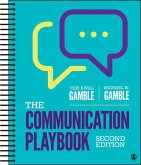Norvell Northcutt, Danny McCoy
Interactive Qualitative Analysis
A Systems Method for Qualitative Research
Schade – dieser Artikel ist leider ausverkauft. Sobald wir wissen, ob und wann der Artikel wieder verfügbar ist, informieren wir Sie an dieser Stelle.
Norvell Northcutt, Danny McCoy
Interactive Qualitative Analysis
A Systems Method for Qualitative Research
- Gebundenes Buch
- Merkliste
- Auf die Merkliste
- Bewerten Bewerten
- Teilen
- Produkt teilen
- Produkterinnerung
- Produkterinnerung
`Students in qualitative classes often have a difficult time grasping abstract concepts related to data collection, coding, and analysis. One benefit of [this book] is the systematic manner in which all of these take place. This text does a nice job of creating a system of checks and balances for the qualitative researcher' - Justin M Laird, SUNY Brockport Aimed at helping students unscramble the mysteries of qualitative data collection, coding, and analysis, this book integrates and reconciles theory and methods by showing how to use a systematic, qualitative technique: interactive qualitative analysis.…mehr
Andere Kunden interessierten sich auch für
![Conducting Focus Groups for Business and Management Students Conducting Focus Groups for Business and Management Students]() Caroline J OatesConducting Focus Groups for Business and Management Students149,99 €
Caroline J OatesConducting Focus Groups for Business and Management Students149,99 €![Qualitative Research Interviewing Qualitative Research Interviewing]() Tom WengrafQualitative Research Interviewing260,99 €
Tom WengrafQualitative Research Interviewing260,99 €![Keywords in Qualitative Methods Keywords in Qualitative Methods]() Michael BloorKeywords in Qualitative Methods172,99 €
Michael BloorKeywords in Qualitative Methods172,99 €![Doing Qualitative Research Using Your Computer Doing Qualitative Research Using Your Computer]() Chris HahnDoing Qualitative Research Using Your Computer198,99 €
Chris HahnDoing Qualitative Research Using Your Computer198,99 €![Modes of Thinking for Qualitative Data Analysis Modes of Thinking for Qualitative Data Analysis]() Melissa FreemanModes of Thinking for Qualitative Data Analysis197,99 €
Melissa FreemanModes of Thinking for Qualitative Data Analysis197,99 €![Educational Research Educational Research]() Robert Burke JohnsonEducational Research146,99 €
Robert Burke JohnsonEducational Research146,99 €![The Communication Playbook The Communication Playbook]() Teri Kwal GambleThe Communication Playbook132,99 €
Teri Kwal GambleThe Communication Playbook132,99 €-
-
`Students in qualitative classes often have a difficult time grasping abstract concepts related to data collection, coding, and analysis. One benefit of [this book] is the systematic manner in which all of these take place. This text does a nice job of creating a system of checks and balances for the qualitative researcher' - Justin M Laird, SUNY Brockport Aimed at helping students unscramble the mysteries of qualitative data collection, coding, and analysis, this book integrates and reconciles theory and methods by showing how to use a systematic, qualitative technique: interactive qualitative analysis.
Produktdetails
- Produktdetails
- Verlag: Sage Publications
- Seitenzahl: 472
- Erscheinungstermin: 28. Februar 2004
- Englisch
- Abmessung: 263mm x 184mm x 31mm
- Gewicht: 1007g
- ISBN-13: 9780761928331
- ISBN-10: 0761928332
- Artikelnr.: 21504419
- Herstellerkennzeichnung
- Libri GmbH
- Europaallee 1
- 36244 Bad Hersfeld
- gpsr@libri.de
- Verlag: Sage Publications
- Seitenzahl: 472
- Erscheinungstermin: 28. Februar 2004
- Englisch
- Abmessung: 263mm x 184mm x 31mm
- Gewicht: 1007g
- ISBN-13: 9780761928331
- ISBN-10: 0761928332
- Artikelnr.: 21504419
- Herstellerkennzeichnung
- Libri GmbH
- Europaallee 1
- 36244 Bad Hersfeld
- gpsr@libri.de
Dr. Northcutt teaches courses in quantitative and qualitative research methods and serves as research advisor on many CCLP dissertation committees. In addition, he serves as Technical Advisor to the Center for Community College Student Engagement (CCCSE) Project. After conducting a series of national research and development projects in adult functional literacy, for which he was the U.S. nominee for the UNESCO world literacy award, Northcutt was named Director of Research for the Southwest Educational Development Laboratory. He then went to Austin Community College, where he taught math statistics and computer science while serving as director of the college¿s administrative computing system and as Director of Analysis for ACC¿s Office of Institutional Effectiveness.
Prologue: A True Story Acknowledgments 1. Paradigm Wars: The Place of IQA Particles and People : The Relationship of the Observer and the Observed The Paradox of Representation Paradigm Wars A Framework for Discourse More Than a Laundry List Revisiting Kuhn The Problem With Zealots Discourse and Dialectics Aristotelian Logic Aquinas and the Scholastics The Limitations of Logic A Dialectical Alternative The Ideology of IQA Beliefs and Values Redux Looking Back and Looking Forward 2. Systems as Representations In for a Dime, In for a Dollar Corvettes, Golden Means, and Fibonacci Numbers Reification, Reality, and Social Construction Understanding a System Research Questions and Systems What Is Research? Systems Topology Drivers and Outcomes Topological Zones Comparing the Two Models: Ritz Crackers and Coffee Cups Epistemological Acrobatics: Zooming In, Zooming Out, and Looping Making Sense of Systems: A Preview of Rationalization Rigor and the Nature of Qualitative Research IQA Systems 3. IQA Research Flow Bricolage or Petit Point? The Researcher
s Footprint Overview of the IQA Research Flow Group Realities: IQA Focus Groups IQA Interviews IQA Results 4. IQA Research Design: Thinking About the Problem Where Do I Start? An Epistemological Dialectic Synthesis, Not Compromise Research Design as a System Touring the System: An Example Final Reflections Case Example 5. Group Reality: System Elements In Debt to TQM Affinities: The Building Blocks of Mindmaps Affinities and Variables: A Rough Analogy The Power of Naming: Constructing Affinities Designing the Focus Group Focus Group Facilitation: Preparing to Conduct a Focus Group Exercise Warm-Up Exercises: Some Variations Architecture and Warm-Ups: The Same Principles Apply Brainstorming the Rudiments of Meaning Facilitator
s Role and Functions Clarification of Meaning Affinity Analysis: The Logic of Inductive and Axial Coding Back to the Focus Group Inductive Coding Axial Coding Affinity Descriptions Facilitation Guidelines: Flags for the Facilitator Systems and IQA Focus Group Protocols Case Example 6. Group Reality: System Relationships Theory of Theoretical Coding What Is Theoretical Coding? Issue 1: Level of Detail Issue 2: Organizing the Focus Group Issue 3: Creating a Group Composite Steps and Variations for Focus Group Theoretical Coding Design Considerations Focus Groups and Follow-Up Interviews Focus Group-Only Research Creating a Group Composite: The IRD Determining Drivers and Outcomes Focus Group System Influence Diagram Protocol for Drawing the SID and Removing Redundant Links Conclusion Case Example 7. Individual Reality: The IQA Interview The Role of Interviews The Power of the Gods Data, Analysis, and IQA Structure and Purpose of the IQA Interview Procedure for Creating an Interview Protocol Preparing for the Interview Logistical and Operational Details Improvisation Within Structure Some More Tips for Interviewing Conclusion Case Example 8. Individual Reality: System Relationships Individual and Group Analytics Individual Interview Coding Combined Interview Coding 9. Description IQA Theory and Presentation Format The IQA Cookbook: A Detailed Outline for the "Typical IQA" Study Affinities and Researcher Engagement Turning the Write-Up Crank Case Example: Research Purpose Literature Review Case Example: Literature Review Methodology Documentation Describing the Results Case Example: Describing the Results Describing Relationships Case Example: Describing Relationships Feedback Loops, Zooming, and Naming Case Example: Feedback Loops, Zooming, and Naming Turn the Crank Again 10. Interpretation Representation and Interpretation Interpreting the Results Comparing Affinities Case Example: Compairing Affinities Comparing Composite Systems Case Example: Comparing Composite Systems Describing Individual Variations Case Example: Describing Individual Variations Applied Meaning: Forecasts and Interventions Same Issue, Different Constituencies Same Constituency, Different Issues: Metacomparisons Looking Back and Looking to the End 11. Comparisons, Interpretations, and Theories: Some Examples Overview Case I. Power and Gender: Two Different Worlds Case II. Body Image, Eating Disorders, and Media Messages Case III. Principals
Supervision Styles in High- and Low-Performing Schools Case IV. Education Entrepreneurs: Leaders and Followers Case V. Rural Community Visioning Case VI. The Graduate School Experience Case VII. Text Analysis Afterword References Index About the Authors
s Footprint Overview of the IQA Research Flow Group Realities: IQA Focus Groups IQA Interviews IQA Results 4. IQA Research Design: Thinking About the Problem Where Do I Start? An Epistemological Dialectic Synthesis, Not Compromise Research Design as a System Touring the System: An Example Final Reflections Case Example 5. Group Reality: System Elements In Debt to TQM Affinities: The Building Blocks of Mindmaps Affinities and Variables: A Rough Analogy The Power of Naming: Constructing Affinities Designing the Focus Group Focus Group Facilitation: Preparing to Conduct a Focus Group Exercise Warm-Up Exercises: Some Variations Architecture and Warm-Ups: The Same Principles Apply Brainstorming the Rudiments of Meaning Facilitator
s Role and Functions Clarification of Meaning Affinity Analysis: The Logic of Inductive and Axial Coding Back to the Focus Group Inductive Coding Axial Coding Affinity Descriptions Facilitation Guidelines: Flags for the Facilitator Systems and IQA Focus Group Protocols Case Example 6. Group Reality: System Relationships Theory of Theoretical Coding What Is Theoretical Coding? Issue 1: Level of Detail Issue 2: Organizing the Focus Group Issue 3: Creating a Group Composite Steps and Variations for Focus Group Theoretical Coding Design Considerations Focus Groups and Follow-Up Interviews Focus Group-Only Research Creating a Group Composite: The IRD Determining Drivers and Outcomes Focus Group System Influence Diagram Protocol for Drawing the SID and Removing Redundant Links Conclusion Case Example 7. Individual Reality: The IQA Interview The Role of Interviews The Power of the Gods Data, Analysis, and IQA Structure and Purpose of the IQA Interview Procedure for Creating an Interview Protocol Preparing for the Interview Logistical and Operational Details Improvisation Within Structure Some More Tips for Interviewing Conclusion Case Example 8. Individual Reality: System Relationships Individual and Group Analytics Individual Interview Coding Combined Interview Coding 9. Description IQA Theory and Presentation Format The IQA Cookbook: A Detailed Outline for the "Typical IQA" Study Affinities and Researcher Engagement Turning the Write-Up Crank Case Example: Research Purpose Literature Review Case Example: Literature Review Methodology Documentation Describing the Results Case Example: Describing the Results Describing Relationships Case Example: Describing Relationships Feedback Loops, Zooming, and Naming Case Example: Feedback Loops, Zooming, and Naming Turn the Crank Again 10. Interpretation Representation and Interpretation Interpreting the Results Comparing Affinities Case Example: Compairing Affinities Comparing Composite Systems Case Example: Comparing Composite Systems Describing Individual Variations Case Example: Describing Individual Variations Applied Meaning: Forecasts and Interventions Same Issue, Different Constituencies Same Constituency, Different Issues: Metacomparisons Looking Back and Looking to the End 11. Comparisons, Interpretations, and Theories: Some Examples Overview Case I. Power and Gender: Two Different Worlds Case II. Body Image, Eating Disorders, and Media Messages Case III. Principals
Supervision Styles in High- and Low-Performing Schools Case IV. Education Entrepreneurs: Leaders and Followers Case V. Rural Community Visioning Case VI. The Graduate School Experience Case VII. Text Analysis Afterword References Index About the Authors
Prologue: A True Story Acknowledgments 1. Paradigm Wars: The Place of IQA Particles and People : The Relationship of the Observer and the Observed The Paradox of Representation Paradigm Wars A Framework for Discourse More Than a Laundry List Revisiting Kuhn The Problem With Zealots Discourse and Dialectics Aristotelian Logic Aquinas and the Scholastics The Limitations of Logic A Dialectical Alternative The Ideology of IQA Beliefs and Values Redux Looking Back and Looking Forward 2. Systems as Representations In for a Dime, In for a Dollar Corvettes, Golden Means, and Fibonacci Numbers Reification, Reality, and Social Construction Understanding a System Research Questions and Systems What Is Research? Systems Topology Drivers and Outcomes Topological Zones Comparing the Two Models: Ritz Crackers and Coffee Cups Epistemological Acrobatics: Zooming In, Zooming Out, and Looping Making Sense of Systems: A Preview of Rationalization Rigor and the Nature of Qualitative Research IQA Systems 3. IQA Research Flow Bricolage or Petit Point? The Researcher
s Footprint Overview of the IQA Research Flow Group Realities: IQA Focus Groups IQA Interviews IQA Results 4. IQA Research Design: Thinking About the Problem Where Do I Start? An Epistemological Dialectic Synthesis, Not Compromise Research Design as a System Touring the System: An Example Final Reflections Case Example 5. Group Reality: System Elements In Debt to TQM Affinities: The Building Blocks of Mindmaps Affinities and Variables: A Rough Analogy The Power of Naming: Constructing Affinities Designing the Focus Group Focus Group Facilitation: Preparing to Conduct a Focus Group Exercise Warm-Up Exercises: Some Variations Architecture and Warm-Ups: The Same Principles Apply Brainstorming the Rudiments of Meaning Facilitator
s Role and Functions Clarification of Meaning Affinity Analysis: The Logic of Inductive and Axial Coding Back to the Focus Group Inductive Coding Axial Coding Affinity Descriptions Facilitation Guidelines: Flags for the Facilitator Systems and IQA Focus Group Protocols Case Example 6. Group Reality: System Relationships Theory of Theoretical Coding What Is Theoretical Coding? Issue 1: Level of Detail Issue 2: Organizing the Focus Group Issue 3: Creating a Group Composite Steps and Variations for Focus Group Theoretical Coding Design Considerations Focus Groups and Follow-Up Interviews Focus Group-Only Research Creating a Group Composite: The IRD Determining Drivers and Outcomes Focus Group System Influence Diagram Protocol for Drawing the SID and Removing Redundant Links Conclusion Case Example 7. Individual Reality: The IQA Interview The Role of Interviews The Power of the Gods Data, Analysis, and IQA Structure and Purpose of the IQA Interview Procedure for Creating an Interview Protocol Preparing for the Interview Logistical and Operational Details Improvisation Within Structure Some More Tips for Interviewing Conclusion Case Example 8. Individual Reality: System Relationships Individual and Group Analytics Individual Interview Coding Combined Interview Coding 9. Description IQA Theory and Presentation Format The IQA Cookbook: A Detailed Outline for the "Typical IQA" Study Affinities and Researcher Engagement Turning the Write-Up Crank Case Example: Research Purpose Literature Review Case Example: Literature Review Methodology Documentation Describing the Results Case Example: Describing the Results Describing Relationships Case Example: Describing Relationships Feedback Loops, Zooming, and Naming Case Example: Feedback Loops, Zooming, and Naming Turn the Crank Again 10. Interpretation Representation and Interpretation Interpreting the Results Comparing Affinities Case Example: Compairing Affinities Comparing Composite Systems Case Example: Comparing Composite Systems Describing Individual Variations Case Example: Describing Individual Variations Applied Meaning: Forecasts and Interventions Same Issue, Different Constituencies Same Constituency, Different Issues: Metacomparisons Looking Back and Looking to the End 11. Comparisons, Interpretations, and Theories: Some Examples Overview Case I. Power and Gender: Two Different Worlds Case II. Body Image, Eating Disorders, and Media Messages Case III. Principals
Supervision Styles in High- and Low-Performing Schools Case IV. Education Entrepreneurs: Leaders and Followers Case V. Rural Community Visioning Case VI. The Graduate School Experience Case VII. Text Analysis Afterword References Index About the Authors
s Footprint Overview of the IQA Research Flow Group Realities: IQA Focus Groups IQA Interviews IQA Results 4. IQA Research Design: Thinking About the Problem Where Do I Start? An Epistemological Dialectic Synthesis, Not Compromise Research Design as a System Touring the System: An Example Final Reflections Case Example 5. Group Reality: System Elements In Debt to TQM Affinities: The Building Blocks of Mindmaps Affinities and Variables: A Rough Analogy The Power of Naming: Constructing Affinities Designing the Focus Group Focus Group Facilitation: Preparing to Conduct a Focus Group Exercise Warm-Up Exercises: Some Variations Architecture and Warm-Ups: The Same Principles Apply Brainstorming the Rudiments of Meaning Facilitator
s Role and Functions Clarification of Meaning Affinity Analysis: The Logic of Inductive and Axial Coding Back to the Focus Group Inductive Coding Axial Coding Affinity Descriptions Facilitation Guidelines: Flags for the Facilitator Systems and IQA Focus Group Protocols Case Example 6. Group Reality: System Relationships Theory of Theoretical Coding What Is Theoretical Coding? Issue 1: Level of Detail Issue 2: Organizing the Focus Group Issue 3: Creating a Group Composite Steps and Variations for Focus Group Theoretical Coding Design Considerations Focus Groups and Follow-Up Interviews Focus Group-Only Research Creating a Group Composite: The IRD Determining Drivers and Outcomes Focus Group System Influence Diagram Protocol for Drawing the SID and Removing Redundant Links Conclusion Case Example 7. Individual Reality: The IQA Interview The Role of Interviews The Power of the Gods Data, Analysis, and IQA Structure and Purpose of the IQA Interview Procedure for Creating an Interview Protocol Preparing for the Interview Logistical and Operational Details Improvisation Within Structure Some More Tips for Interviewing Conclusion Case Example 8. Individual Reality: System Relationships Individual and Group Analytics Individual Interview Coding Combined Interview Coding 9. Description IQA Theory and Presentation Format The IQA Cookbook: A Detailed Outline for the "Typical IQA" Study Affinities and Researcher Engagement Turning the Write-Up Crank Case Example: Research Purpose Literature Review Case Example: Literature Review Methodology Documentation Describing the Results Case Example: Describing the Results Describing Relationships Case Example: Describing Relationships Feedback Loops, Zooming, and Naming Case Example: Feedback Loops, Zooming, and Naming Turn the Crank Again 10. Interpretation Representation and Interpretation Interpreting the Results Comparing Affinities Case Example: Compairing Affinities Comparing Composite Systems Case Example: Comparing Composite Systems Describing Individual Variations Case Example: Describing Individual Variations Applied Meaning: Forecasts and Interventions Same Issue, Different Constituencies Same Constituency, Different Issues: Metacomparisons Looking Back and Looking to the End 11. Comparisons, Interpretations, and Theories: Some Examples Overview Case I. Power and Gender: Two Different Worlds Case II. Body Image, Eating Disorders, and Media Messages Case III. Principals
Supervision Styles in High- and Low-Performing Schools Case IV. Education Entrepreneurs: Leaders and Followers Case V. Rural Community Visioning Case VI. The Graduate School Experience Case VII. Text Analysis Afterword References Index About the Authors








